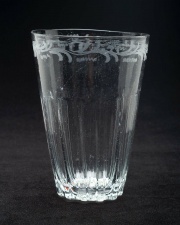Difference between revisions of "Soda glass"
Jump to navigation
Jump to search
m (Text replace - "== Authority ==" to "== Sources Checked for Data in Record ==") |
|||
| (3 intermediate revisions by 2 users not shown) | |||
| Line 1: | Line 1: | ||
| − | [[File:69.376-SC42616.jpg|thumb|]] | + | [[File:69.376-SC42616.jpg|thumb|Tumbler<br>MFA# 69.376]] |
== Description == | == Description == | ||
| − | Common name for glass having a high [ | + | Common name for glass having a high [[sodium|sodium]] content. Soda glass has the approximate composition 71-78% SiO2, 12-17% Na2O, 5-15% CaO, and 1-4% other. The soda is added as soda ash ([[sodium%20carbonate|sodium carbonate]]), niter ([[sodium%20nitrate|sodium nitrate]]) and/or salt cake ([[sodium%20sulfate|sodium sulfate]]). The calcium is added as limestone ([[calcium%20carbonate|calcium carbonate]]) or burnt lime ([[calcium%20oxide|calcium oxide]]) and the silica is added as sand ([[silicon%20dioxide|silicon dioxide]]). Cullet or broken glass, is used as a flux. Soda glass was also called common glass. Common glass often has a green tinge due to [[iron|iron]] impurities in the ingredients. |
== Synonyms and Related Terms == | == Synonyms and Related Terms == | ||
| Line 8: | Line 8: | ||
common glass; soda lime glass; soda-lime glass; soda-lime-silica glass; verre sodique (Fr.); vidro sódico (Port.); standard window glass; Corning 0081; alkali glass | common glass; soda lime glass; soda-lime glass; soda-lime-silica glass; verre sodique (Fr.); vidro sódico (Port.); standard window glass; Corning 0081; alkali glass | ||
| + | ==Physical and Chemical Properties== | ||
{| class="wikitable" | {| class="wikitable" | ||
|- | |- | ||
! scope="row"| Melting Point | ! scope="row"| Melting Point | ||
| − | | 695 (softens) | + | | 695 C (softens) |
|- | |- | ||
! scope="row"| Density | ! scope="row"| Density | ||
| − | | 2. | + | | 2.5 g.ml |
|- | |- | ||
! scope="row"| Refractive Index | ! scope="row"| Refractive Index | ||
| − | | 1.512 | + | | 1.512 - 1.518 |
|} | |} | ||
| − | == | + | ==Resources and Citations== |
* G.S.Brady, ''Materials Handbook'', McGraw-Hill Book Co., New York, 1971 Comment: p. 361 | * G.S.Brady, ''Materials Handbook'', McGraw-Hill Book Co., New York, 1971 Comment: p. 361 | ||
Latest revision as of 12:31, 24 October 2023
Description
Common name for glass having a high Sodium content. Soda glass has the approximate composition 71-78% SiO2, 12-17% Na2O, 5-15% CaO, and 1-4% other. The soda is added as soda ash (Sodium carbonate), niter (Sodium nitrate) and/or salt cake (Sodium sulfate). The calcium is added as limestone (Calcium carbonate) or burnt lime (Calcium oxide) and the silica is added as sand (Silicon dioxide). Cullet or broken glass, is used as a flux. Soda glass was also called common glass. Common glass often has a green tinge due to Iron impurities in the ingredients.
Synonyms and Related Terms
common glass; soda lime glass; soda-lime glass; soda-lime-silica glass; verre sodique (Fr.); vidro sódico (Port.); standard window glass; Corning 0081; alkali glass
Physical and Chemical Properties
| Melting Point | 695 C (softens) |
|---|---|
| Density | 2.5 g.ml |
| Refractive Index | 1.512 - 1.518 |
Resources and Citations
- G.S.Brady, Materials Handbook, McGraw-Hill Book Co., New York, 1971 Comment: p. 361
- Susan E. Schur, Conservation Terminology: A review of Past & Current Nomenclature of Materials, Technology and Conservation, Spring (p.34-39); Summer (p.35-38); Fall (p.25-36), 1985
- Dictionary of Building Preservation, Ward Bucher, ed., John Wiley & Sons, Inc., New York City, 1996
- Van Nostrand's Scientific Encyclopedia, Douglas M. Considine (ed.), Van Nostrand Reinhold, New York, 1976
